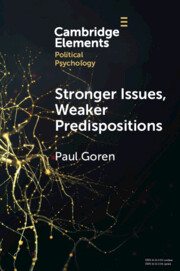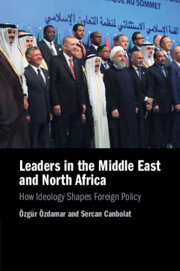Refine search
Actions for selected content:
74 results
Beyond innumeracy: measuring public misperceptions about immigration
-
- Journal:
- Political Science Research and Methods , First View
- Published online by Cambridge University Press:
- 17 November 2025, pp. 1-18
-
- Article
-
- You have access
- Open access
- HTML
- Export citation
No One Mourns the Wicked: The Limits of Partisan Hostility Persisting through Tragedy
-
- Journal:
- Journal of Experimental Political Science , First View
- Published online by Cambridge University Press:
- 15 October 2025, pp. 1-21
-
- Article
-
- You have access
- Open access
- HTML
- Export citation
“Sleeping with the enemy”: partisanship and tolerance in online dating
-
- Journal:
- Political Science Research and Methods , First View
- Published online by Cambridge University Press:
- 02 September 2025, pp. 1-23
-
- Article
-
- You have access
- Open access
- HTML
- Export citation
The effects of forced versus selective exposure to propaganda in China
-
- Journal:
- Political Science Research and Methods , First View
- Published online by Cambridge University Press:
- 15 August 2025, pp. 1-21
-
- Article
-
- You have access
- Open access
- HTML
- Export citation
Varieties of Anxieties: Disaggregating Emotion and Voting Behaviour in the COVID-19 Era
-
- Journal:
- British Journal of Political Science / Volume 55 / 2025
- Published online by Cambridge University Press:
- 20 June 2025, e87
-
- Article
-
- You have access
- Open access
- HTML
- Export citation
How social desirability bias impacts the expression of emotions
-
- Journal:
- Political Science Research and Methods , First View
- Published online by Cambridge University Press:
- 03 June 2025, pp. 1-10
-
- Article
-
- You have access
- Open access
- HTML
- Export citation
Deliberation and Human Nature – CORRIGENDUM
-
- Journal:
- British Journal of Political Science / Volume 55 / 2025
- Published online by Cambridge University Press:
- 28 April 2025, e69
-
- Article
-
- You have access
- Open access
- HTML
- Export citation
Deliberation and Human Nature
-
- Journal:
- British Journal of Political Science / Volume 55 / 2025
- Published online by Cambridge University Press:
- 24 March 2025, e46
-
- Article
-
- You have access
- Open access
- HTML
- Export citation
Categorizing Topics Versus Inferring Attitudes: A Theory and Method for Analyzing Open-ended Survey Responses
-
- Journal:
- Political Analysis / Volume 33 / Issue 3 / July 2025
- Published online by Cambridge University Press:
- 24 January 2025, pp. 231-251
-
- Article
-
- You have access
- Open access
- HTML
- Export citation
5 - Stretching the Limits of Science: Was the Implicit-Racism Debate a “Bridge Too Far” for Social Psychology?
- from Section I - What is Implicit Bias and (How) Can We Measure It?
-
-
- Book:
- The Cambridge Handbook of Implicit Bias and Racism
- Published online:
- 21 December 2024
- Print publication:
- 02 January 2025, pp 149-168
-
- Chapter
- Export citation

Stronger Issues, Weaker Predispositions
- Abortion, Gay Rights, and Authoritarianism
-
- Published online:
- 09 December 2024
- Print publication:
- 16 January 2025
-
- Element
- Export citation
Shared Demographic Characteristics Do Not Reliably Facilitate Persuasion in Interpersonal Conversations: Evidence from Eight Experiments
-
- Journal:
- British Journal of Political Science / Volume 54 / Issue 4 / October 2024
- Published online by Cambridge University Press:
- 27 November 2024, pp. 1477-1485
-
- Article
-
- You have access
- Open access
- HTML
- Export citation
Vulnerability Appeals in the COVID-19 Pandemic: Insights from a National Survey Experiment
-
- Journal:
- Journal of Experimental Political Science / Volume 12 / Issue 2 / Summer 2025
- Published online by Cambridge University Press:
- 31 October 2024, pp. 202-217
-
- Article
-
- You have access
- Open access
- HTML
- Export citation
Facial finetuning: using pretrained image classification models to predict politicians’ success
-
- Journal:
- Political Science Research and Methods / Volume 13 / Issue 4 / October 2025
- Published online by Cambridge University Press:
- 26 September 2024, pp. 1031-1041
-
- Article
-
- You have access
- Open access
- HTML
- Export citation
The policy basis of group sentiments
-
- Journal:
- Political Science Research and Methods / Volume 13 / Issue 2 / April 2025
- Published online by Cambridge University Press:
- 16 September 2024, pp. 482-488
-
- Article
-
- You have access
- Open access
- HTML
- Export citation

The Social Psychology of Trauma
- Connecting the Personal and the Political
-
- Published online:
- 04 April 2024
- Print publication:
- 11 April 2024
-
- Book
-
- You have access
- Open access
- Export citation
Justice Isn’t Blind: Attorney Attractiveness and Success in US Federal Court
-
- Journal:
- Journal of Law and Courts / Volume 12 / Issue 2 / October 2024
- Published online by Cambridge University Press:
- 04 March 2024, pp. 413-434
-
- Article
- Export citation
Advisers and Aggregation in Foreign Policy Decision Making
-
- Journal:
- International Organization / Volume 78 / Issue 1 / Winter 2024
- Published online by Cambridge University Press:
- 08 February 2024, pp. 1-37
- Print publication:
- Winter 2024
-
- Article
-
- You have access
- Open access
- HTML
- Export citation
Evaluating methods for examining the relative persuasiveness of policy arguments
-
- Journal:
- Political Science Research and Methods / Volume 13 / Issue 1 / January 2025
- Published online by Cambridge University Press:
- 17 November 2023, pp. 229-236
-
- Article
-
- You have access
- Open access
- HTML
- Export citation

Leaders in the Middle East and North Africa
- How Ideology Shapes Foreign Policy
-
- Published online:
- 03 August 2023
- Print publication:
- 17 August 2023
